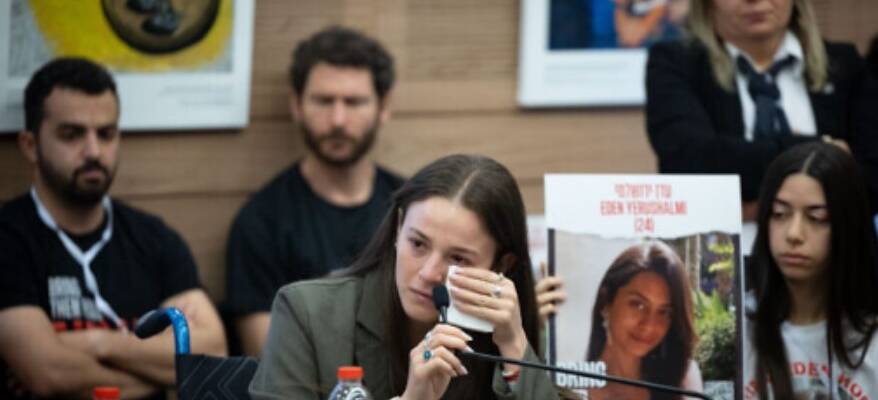The Hostages and Missing Families Forum Headquarters noted that these findings were based on the treatment of 105 hostages who were freed after 50 days.
By Pesach Benson, TPS
Israel’s Health Ministry finalized a report detailing severe physical and psychological abuse suffered by hostages in Gaza, including children, who were released during a November 2023 temporary ceasefire. The report — the first comprehensive account of hostages’ experiences — will be submitted to the United Nations.
“Torture. Physical and psychological torture. Starvation. Sexual abuse. Beatings. Branding,” tweeted Israeli President Isaac Herzog in response. “Just some of the horrific words that jump from the pages of the Ministry of Health’s submission to the UN on the horrific ordeal endured by the hostages at the hands of Hamas terrorist murderers and rapists in Gaza.”
Hostages were subjected to extreme conditions, including sexual assaults, prolonged periods in darkness, physical beatings, and starvation. Many were bound hand and foot and deprived of adequate food and water.
Several endured additional horrors, such as being burned or branded with heated metal. Medical care was either withheld or administered without pain relief, resulting in excruciating suffering during procedures, including surgeries.
Hostages were denied basic hygiene, and often forced to soil themselves due to prolonged waits for toilet access. Released individuals described being deliberately separated from family members and compelled to watch videos of the October 7 atrocities, adding to their psychological trauma.
The Hostages and Missing Families Forum Headquarters noted that these findings were based on the treatment of 105 hostages who were freed after 50 days.
“Today, it has been almost 450 days, and over half of the 100 hostages – those still alive in Hamas captivity – continue to suffer this same unbearable reality,” the Forum said. “To the world, its leaders, and humanitarian organizations: How can you watch this torture continue? How can you remain silent?”
The names, ages and family status of the hostages were excluded from the report to protect their privacy.
Sexual Abuse, Medical Neglect
“Two of the children that were held together during captivity reported that they were held bound and were beaten throughout their captivity. Signs of binding, scars, and marks consistent with trauma were found.
Additionally, two young children had burn marks on their lower limbs. One child stated that the burns were the result of a deliberate branding with a heated object,” the report said.
“Both the child and adults who were with him in captivity described the incident as a purposeful branding event, not an accident. It was described as an extremely traumatic experience. Cases of Physical and Sexual Violence Against Women and Men One of the returned hostages described being sexually assaulted at gunpoint by a Hamas terrorist,” the report continued, adding, “On several occasions, captors forced women of all ages to undress while others, including the captors, watched. Some women reported that the captors sexually assaulted them.”
The report also addressed the neglect of the hostages’ medical conditions.
“The hostages were denied medical treatment for acute injuries caused during October 7 and subsequently, in addition to for untreated chronic conditions. Fractures, shrapnel wounds, and burns were treated inadequately, leading to complications which required additional surgeries, that could have been prevented with proper care,” the report said.
“The captors also tortured those injured by performing painful procedures without anesthesia. Many hostages also suffered from untreated chronic conditions (e.g., heart failure, diabetes, hypothyroidism), leading to severe short-term medical deterioration, such as low blood pressure, bradycardia, and hypothermia. In one case a hostage died from untreated medical complications. Also, several older women required urgent life-saving treatment due to untreated hypertension and hypothyroidism.”
Prolonged abuse led to significant weight loss among the hostages. Adults lost between 8 and 15 kilograms (18 to 33 pounds), while child captives experienced weight losses averaging 10% of their body weight, with some cases as high as 18%, leading to muscle deterioration, weakened immune systems, and persistent gastrointestinal issues.
Psychological Toll
The psychological consequences were equally dire. Former hostages, including children, suffer from acute anxiety, panic attacks, and difficulty reintegrating into daily life. Many experience disrupted sleep, fear of leaving their homes, and even physical symptoms like unexplained pain.
Eating disorders have also been reported, with some individuals overeating while others eat very little. Children in particular exhibit signs of lingering trauma, such as hoarding food, the report noted.
As the 2023 ceasefire deal neared, captors reportedly provided hostages with more food and fresh clothing in an apparent attempt to misrepresent their conditions. Israeli authorities have expressed concerns about the potential health risks of abrupt overfeeding for remaining hostages, who have now endured over 440 days in captivity.
“The testimonies presented in this report serve as a wake-up call for the international community to apply increased pressure on Hamas and its supporters to free all the hostages without delay,” said Health Minister Uriel Busso.
“I urge the global community to utilize all available means to end this cruelty and bring the hostages home immediately. It is a moral and humanitarian imperative, and the time to act is running out.”
On Tuesday, 77-year-old Hana Katzir, who was one of the 105 captives released in the prisoner exchange, died. The family said Katzir did not have heart medication or a walker while in captivity.
At least 1,200 people were killed, and 252 Israelis and foreigners were taken hostage in Hamas’s attacks on Israeli communities near the Gaza border on October 7. Of the 97 remaining hostages, more than 30 have been declared dead. Hamas has also been holding captive two Israeli civilians since 2014 and 2015, and the bodies of two soldiers killed in 2014.
